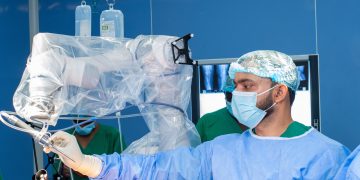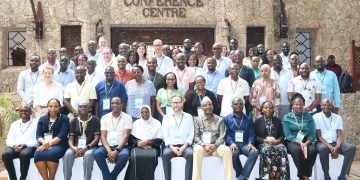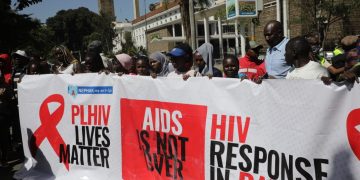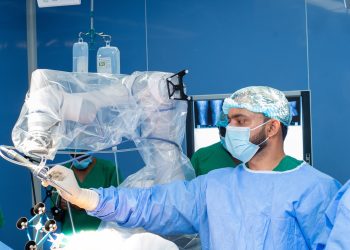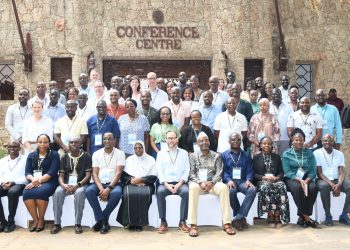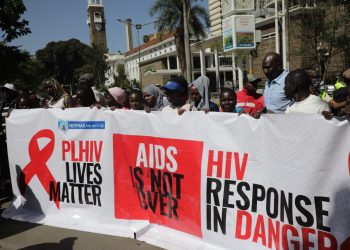By Winnie Osika
Hadassa Trip took to her Facebook page to share a very personal story about how she has for over 11 years been battling with infertility.
She chose to share the story with hopes of inspiring someone going through a similar situation.
In one of her Facebook posts titled, “Blessings in Adversity”, part of it reads, “I have been allowed to be here for a reason, to experience this for a purpose.” It goes on to say, “Similarly, you are walking that seemingly rough path for a reason and a purpose, take a minute and think about it.”
It is a journey that she has embraced fully and accepted whole heartedly, a journey that has come with tears and smiles in equal measure, but also one full of hope.
Trip narrates her journey of trying to get a child for 11 years now and counting, a path she says has not been easy for her but has always kept hope alive that things will change for the better.
Just like any other couple, the joy of marriage is to get children and start a family, this has also been her dream, but as she puts it in her Facebook profile, she is not infertile, she is not barren, she is just but a waiting womb, waiting on God.
Married in 2007, Hadassa says that there has been several attempts for her to get pregnant, but no positive results were forthcoming.
After seven years of trying to get a child, she was diagnosed with endometriosis in 2013. – A condition that affects a woman’s reproductive organs whereby the tissue that normally lines the uterus grows outside the uterus.
She took the first step and went for surgery to try and remove the fibroids after which she went for a second surgery to correct the condition.
She has also sort hormonal medication and went for numerous tests with her husband whom she says has been very supportive in their journey of trying to get a child.
Hadassa who is still on medication says that the doctors have told her that her situation is mild as per now.
“I can’t really say that the cause of my infertility is endometriosis, but I also can’t rule it out,” she says.
That she has chosen to openly speak about her condition and the whole infertility topic at large without fear of being stigmatized by the society is something that Hadassa is hoping one day will be achieved.
The subject of infertility which currently is being talked about in low tones and in closed doors has brought a whole lot of damage than people actually see as a result of the stigma that has come with it.
The burden in most cases mostly falls on women. And as Hadassah puts it, “You cannot understand what it takes to wait unless you are there yourself, it is very difficult.” She says.
Having gone through the stigma and discrimination herself, she adds that she understands perfectly what the waiting women go through and the kind of risks they are exposed to.
She talks of scenarios where she received backlash from her extended family and also threats from her relatives and that despite being a difficult period in her life. Being a believer made her strong and positive and brave to handle every situation soberly.
“One relative told my husband – I don’t know what you are doing with that woman; just get somebody else to marry if she cannot give you a child.” She narrated.
Hadassa adds that the relative even went a step further and offered to try and get her husband another wife.
The reactions she got after she went public with her condition were more disheartening than encouraging. But this gave her hope and courage to reach out to similar people. After visiting a friend whom she later came to learn was suffering from depression as a result of longing for a child, Hadassa says she got inspired to create a forum and a support group to reach out to women who were in the same condition as her.
This culminated in the formation of “The Waiting Wombs Trust”, an organization that brings together couples who are waiting on a child and a platform where experiences are shared and solutions discussed.
Hadassa mentions that since its inception in March 2017, the trust currently has a membership of 6000 people, both local and international, with around six infertility specialists on board.
Understanding the magnitude of stigma that would come with it, she says that she had to talk to her husband first about it who was very okay with it and has since supported her fully with the initiative.
“I consulted my husband first because I knew going public would mean he had to tag along with me the whole time.” She says.
She adds that through her husband, more men are coming out and attending their meetings and with him fully on board, they are now reaching out to couples to create a balanced platform for them to discuss and share their experiences.
“We are trying to tell people that this is a couple’s affair, not a woman’s affair only, that is why we are also calling men on board to be part of Waiting Wombs because as it is the burden has been left solely on women to bear.” says Hadassah.
More than anything, Hadassa mentions that as much as Waiting Wombs Trust seeks to create awareness on the subject of infertility, they have also come up with various interventions such as partnering with doctors, infertility experts, counselors and even an adoption management board for couples that feel the need to adopt a child.
“We have brought doctors on board and what we are trying to do is to reach out to them to offer subsidized costs on infertility treatment and counseling sessions because these services are normally very expensive. “
The cost of treating infertility has by and large been one of the reasons why many people who as much as may want to get treatment still ignores it as an option. In Vitro Fertilization (IVF) to be specific being an alternative treatment to infertility does not have pocket friendly rates.
According to the IVF Kenya website, the pre-treatment fee which includes consultations and hormonal tests is at least Sh52, 000.
The IVF centre in Nairobi which has been in service since 2004 and is the first medical centre in Kenya to provide IVF treatment offers a wide range of assisted reproductive technologies including IVF and Intracytoplasmic Sperm Injection (ISI) Egg and sperm donation, embryo and sperm cryopreservation, Intrauterine Insemination (IUI), Ovulation induction and others.
The charges on the website indicate that IVF treatment which is inclusive of all treatment costs Sh380, 000 and a repeat of the same procedure costs Sh330, 000.
The site further indicates that the treatment includes all medication for ovarian stimulation, ultrasound examinations, eggs retrieval, and embryo transfer and pregnancy tests.
When the pregnancy test is positive, the patient is to meet all medical expenses.
There are other supplementary treatment costs in the course of the IVF procedure which range between Sh20, 000 and Sh80, 000.
The insemination treatment cost also varies where insemination with partner sperm in a natural cycle costs Sh30, 000 while insemination with donor sperm in a natural cycle costs Sh50, 000.
But even with IVF as an infertility option, Hadassa says that there is still a lot of stigma that comes with conception through the procedure and so Waiting Wombs Trust encourages their members to talk about it and share their experiences in their meetings and also bring an infertility expert on board to talk about the treatment.
Their greatest achievement she says as an organization is that they got one of the doctors on board to give free IVF services to one of their members.
“We realized that most ladies do not seek medication because first they do not know that there is a possibility, two they are scared and three they do not have the finances. We try and address all these issues in our meetings.” She says.
Hadassa’s story is just but one of the many untold experiences that infertile women go through, for her, she has defied all odds by embracing her situation and talking about it publicly without fear or shame, something she hopes the society will embrace too one day.
Infertility or a state of infertility for a woman can manifest itself as either inability to become pregnant, inability to maintain a pregnancy or inability to carry a pregnancy to a live birth.
A report from the Ministry of Health named – Magnitude of Infertility in Kenya 2007, in its social cultural aspect indicated that a woman’s social status, direction in life, economic achievement, wellbeing and the very meaning of marital life hinges around her ability to bear children.
The ability to bear children therefore according to the report is seen by the society as a true mark of womanhood and pride of a man.
The report further indicates that a childless marital union is plagued by tension resulting from numerous man-made problems, social stigma, economic exploitations and psychological pressure from the husband’s relatives. (Kimani 1995)
It adds that infertility has been consciously and subconsciously constructed to discriminate against the female gender despite the fact that medically, it has been proven that 50 per cent of infertility is actually caused by men.
That there is need to have a culture shift of the mindset that infertility is solely a woman’s problem cannot be over emphasized.
There is need to also have empowerment of infertile women in the continent and support of government policies to regulate fertility care through access to information, health and change of mindset.
One such organization –MERCK – a leading science and technology company is at the fore front of achieving this through its campaign- More than a Mother Initiative.
The organization has partnered with Kenya Women Parliamentary Association, the University of Nairobi and the Kenya Fertility Society to address the needs for interventions to reduce stigmatization and the social suffering of infertile women.
“Providing access to infertility care is important but it is even more important to intervene to decrease stigmatization and social suffering arising from this condition.” says Belen Garijo the Chief Executive Officer of Merck Healthcare.
That the gender discrimination on women on the issue of infertility is so big has made a conclusive report from the Ministry of Health that in most cultural settings, it is normally the woman who is blamed for the couple’s inability to bear children.
Further, the approaches in scientific and clinical research have by and large inadvertently feminized infertility, hence in a sense legitimizing the traditional belief that infertility is essentially woman’s problem.
Medically, studies have proved that the leading cause of infertility in both sexes in the African region is the tubal factor due to infections, sexually transmitted infections and post abortal sepsis.
World Health Organization (WHO) states that infertility in Africa is caused by infections in over 85 per cent of women compared to 33 per cent worldwide.
Merck points out that the consequences of infertility are much more dramatic in developing countries and can create more wide ranging social and cultural problems compared to Western region, particularly women.
Challenges in medical intervention for infertility treatment has proved to be a barrier not only in Kenya but the whole of Africa at large with the biggest setback being the cost of treating infertility and the limited number of qualified infertility experts, embryologists to be specific.
The Programs Director of Merck Foundation Africa region Leonard Saika says that up to 2016, there was no trained embryologist in Kenya but through Merck’s intervention, one lady was trained in Indonesia as an embryologistand is now working with the Kenya Fertility Society as a specialist in that field.
“Previously, IVF doctors used to bring trained embryologists from outside the country, experienced infertility experts, and when you bring doctors from outside, the cost of treatment will definitely be high”, he says.
Going for treatment late, he says has also hindered medical treatment as some people seek intervention when the infection has destroyed them completely.
He adds that lack of awareness and information about these IVF centres is another challenge.
“People are sitting with this condition not knowing that there are centres where they can get medical help.”
He points out that the accessibility of medical infertility products in the market from the manufacturer to the end user has also proved to be a challenge.
Mr. Saika laments that though the government has not given much attention and priority to infertility programs as cancer and HIV/AIDS have, it still cannot be blamed since it cannot do everything and that is where bodies like Merck come in.
That through Merck, students have benefited through trainings on infertility treatment and embryology in India and Indonesia and when they come back, they are linked to fertility societies to work and improve the health care system.
Mr. Saika says that so far 20 doctors have been trained by Merck across Africa.
“We are mainly focusing on training students on embryology since locally doctors are mainly trained as obstetrician gynecologists.” he says.
Merck says that it is important to take into consideration that accessible infertility treatment can only be successfully introduced in developing countries if socio-cultural economic essentials and needed skills are fulfilled and governments are ready to support their introduction.
“Cultural shift is what is important and is what this awareness is aimed at changing.” said Saika.
Just like Merck, Hadassa says that her biggest setback has been to meet everyone’s needs because everyone beliefs that when they come to Waiting Wombs Trust, they conclude that they will be sorted out instantly.
Hadassa hopes that the trust will one day be in partnership with the government and maybe agree to offer free IVF services through the National Hospital Insurance Fund (NHIF) Cover.
She is however positive because through her organization, smiles have been restored in people’s faces as there are about ten success stories of ladies whom after having sessions with waiting wombs trust, have had positive results on their previous situations.
Most importantly, she says that the key issue for her is when infertility will never be a taboo subject.
“I look forward to a day when we will have a Waiting Womb Day, just to create awareness and tell people that you can actually come out and talk about it openly. “ says Hadassa Trip.


